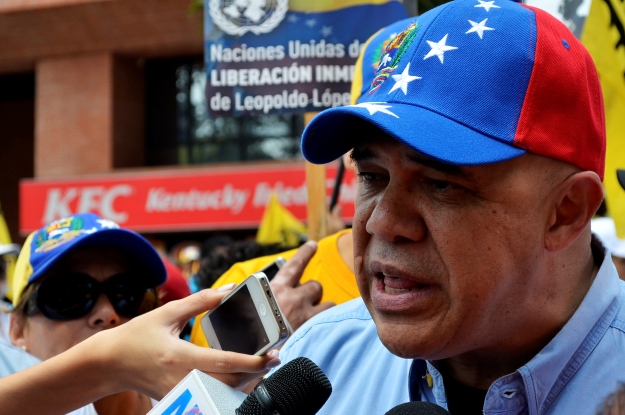Venezuela’s opposition has had to do some soul-searching. Despite a year punctuated by massive street protests and international condemnation of President Nicolás Maduro’s anti-democratic turns, the Democratic Unity Roundtable (MUD), a coalition of opposition parties, ended 2016 with little to celebrate. Its effort to force a recall referendum on Maduro came to naught when the National Electoral Council dismissed the option in late October. Vatican-brokered negotiations with the government also fell apart. And Maduro’s hold on power – which for months had seemed so tenuous – appeared secure as ever after the Supreme Court declared the opposition-held National Assembly illegitimate.
But MUD leaders say that 2017 will be different, and have responded to growing criticism of their efforts with a plan to reorganize, re-strategize, and learn from past mistakes.
“This year, the MUD will transform itself and become more useful in this fight,” Jesús Torrealba, the secretary general of the coalition, told AQ. Torrealba said the MUD will try to appeal to a larger portion of the roughly 80 percent of Venezuelans who oppose Maduro’s rule by rotating its leadership and including civil society – from neighborhood committees to NGOs – in decision-making processes. He added that the group’s primary goal will be to come to agreement on how an opposition government would go about fixing Venezuela’s ailing economy and institutions.
“We spent 2016 talking about mechanisms to take Maduro out of power, but we didn’t talk about what would happen after,” he said.
For Félix Seijas Rodríguez, a political analyst and director of the Delphos poll, that type of thinking is long overdue. “Because of its internal structure, the MUD hasn’t been able to coordinate the different views within the coalition,” Seijas told AQ. “People perceived that, and the government did too.”
That may be why the MUD had trouble using widespread public outrage in 2016 to extract concessions from the Maduro regime. As a flood of regime opponents marched through the streets of Caracas in a protest on Sept. 1, the opposition appeared to have the upper hand. But internal disagreement about what would follow – or even what time the protests would finish – left many marchers feeling dissatisfied. Confusion among the opposition gave the government an opportunity to gain ground, push back against pressure to hold the referendum, and postpone regional and municipal elections, according to analysts.
In the meantime, public support for the MUD’s agenda has waned. Turnout for a Jan. 23 march in Caracas was slim. Many of those who did show up made their frustrations with the MUD known, with one protester shouting “Stop making fun of us” as Freddy Guevara, a member of Popular Will, a MUD coalition party, passed by. “A civil disobedience fight requires the unity of the whole leadership and the people,” Guevara responded.
A week later, Julio Borges, president of the National Assembly and a representative of the First Justice Party, also a MUD member, told a policy forum that the coalition leadership was “sorry for all the mistakes” it had made.
By “re-launching” the coalition with a focus on unifying its message and overcoming internal differences, the MUD hopes to once again channel organized and permanent street pressure against Maduro’s leadership. But in contrast to the marches in 2016, Torrealba said, this year’s protests would continue even if the opportunity to negotiate with Maduro should arise.
“There will be countless marches announced in advance, in addition to spontaneous street protests to outline the people’s demands,” Torrealba said.
With U.S. President Donald Trump expected to take a tough stance toward Maduro and other left-wing governments in the region, Torrealba added that the MUD would renew its appeals to the international community for help pressuring the regime to hold new elections.
But talking about consensus will be easier than achieving it. Henrique Capriles, the governor of Miranda state who battled Maduro in the last elections and belongs to the First Justice party (a MUD member), has been outspoken in his doubts regarding the MUD’s path. He recently said that he disagrees with the way the MUD is managed, and criticized Torrealba for being unable to unite its member parties.
When asked if there was a consensus on the 2017 reorganization plan, Torrealba said, “Well … we are in the process of developing it.”
They better hurry up, according to Asdrubal Oliveros, a Venezuelan economist and director of analysis firm Ecoanalítica. “The more time the opposition takes to construct that unified strategy, the stronger the regime will become, and it will all be harder,” Oliveros told AQ. He said the MUD’s formation as an effort to challenge the late former President Hugo Chávez electorally had left the coalition ill-prepared to deal with a regime that cared little for election outcomes.
“That is why the MUD is in the process of rediscovering itself,” he said. “But it has been too slow to do it.”
That rifts within the opposition are keeping it from succeeding is a familiar tune to many Venezuelans, who for 14 years under Chávez and more than three under Maduro have wondered when the regime’s opponents will get their act together. When asked whether the opposition parties need to put their individual ambitions aside, Torrealba had just one thing to say:
“Amen.”
—
Krygier is an editorial intern for AQ








